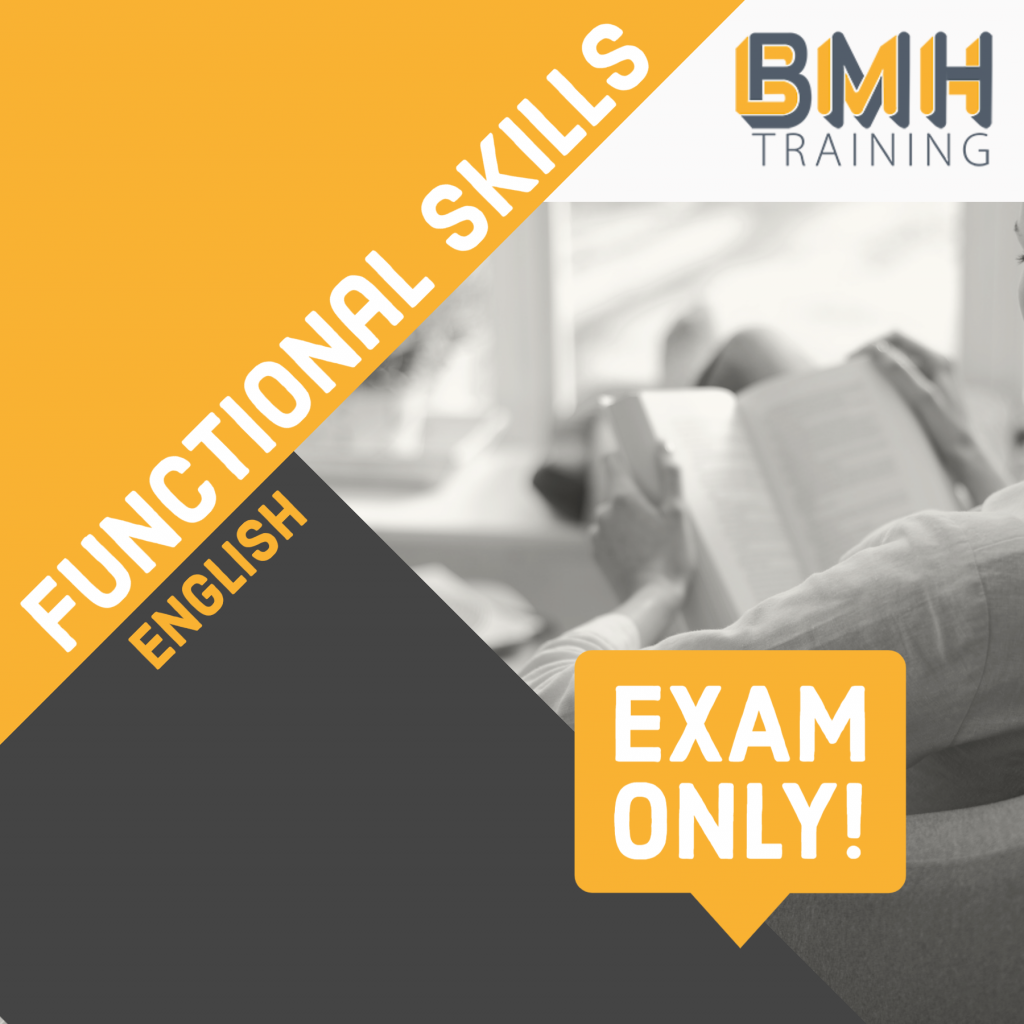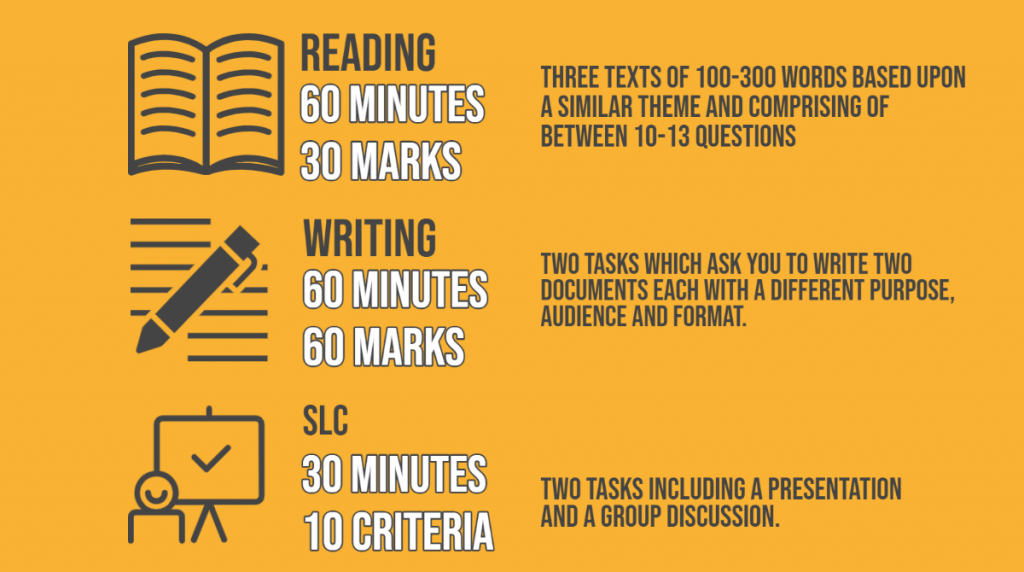
The Functional Skills English Level 2 exam will help you get that promotion you’ve been looking for, or get you onto university courses such as nursing, policing or teaching.
£195 for the complete qualification
£65 for each element booked separately
Functional Skills English Level 2 At a Glance
- Government-approved qualification – OFQUAL regulated
- Accredited by the Open Awards
- Take your exam at home
- Fast turnaround of results
- Get into university, nursing, policing and more
- Reduced resit fees of up to 50% if you don’t pass
- Evening, Saturday and Sunday timeslots are available at no additional cost
What’s included in the Functional Skills English Level 2 Exam?
- Registration with the OFQUAL-regulated awarding body Open Awards
- Level 2 English Reading Exam
- Level 2 English Writing Exam
- Complete Level 2 Speaking, Listening and Communication Exam
- Paper and electronic certificates – get your certificate when you get your pass result!
- Find out more about how it works here!
How will my exam be conducted?
BMH Training offers online examinations with live invigilators using Microsoft Teams, making it convenient for candidates to take exams without the need for additional software or downloads.
What will I need?
- a good quality laptop, Mac or PC with a minimum screen size of approx. 14” and minimum resolution of 1024 x 768 – Chromebook are not compatible
- A webcam and microphone
- An internet browser
- Stable internet connection of at least 3 Mbps
When will I get my marks?
The awarding body provides results for Functional Skills English Reading and Writing examinations within 6 to 32 working days. Once the results are received, they are promptly emailed to the candidates by the Distance Learning team.
Speaking and Listening examinations are subject to external checks and can take 14 and 32 working days to be returned.
What happens if I don’t pass?
If you’re unlucky enough not to reach the pass mark, we offer resits at a discounted price. If you’re not sure if you will pass, check out the Preparing for the Functional Skills Level 2 in English course.
What are the pass rates for the Functional Skills English Level 2 examinations?
The paper assignment percentages vary between 58% and 60% depending on the paper.
When will I get my Functional Skills exam marks?
Open Awards work on a 6 to 32-working-day timeline for marks for Functional Skills examinations to the centre. You will be emailed by the Distance Learning team with your results as soon as we receive them.
What will I be assessed on?
Open Awards Level 2 Functional Skills Qualifications in English support learners to be able to speak, listen, communicate, read and write clearly, accurately, confidently and with effectiveness.
Learners should be:
- Listen, understand and make relevant contributions to discussions with others in a range of contexts;
- Apply their understanding of language to adapt delivery and content to suit the audience and purpose;
- Read a range of different text types confidently and fluently, applying their knowledge and understanding of texts to their own writing;
- Write texts of varying complexity, with accuracy, effectiveness, and correct spelling, punctuation and grammar;
- Understand the situations when, and audiences for which, planning, drafting and using formal language are important, and when they are less important.
Scope of Study
-
Reading
-
Writing
-
Speaking and Listening
- Identify the different situations when the main points are sufficient and when it is important to have specific details
- Compare information, ideas and opinions in different texts, including how they are conveyed
- Identify implicit and inferred meaning in texts
- Understand the relationship between textual features and devices, and how they can be used to shape meaning for different audiences and purposes
- Use a range of reference materials and appropriate resources (e.g. glossaries, legends/keys) for different purposes, including finding the meanings of words in straightforward and complex sources
- Understand organisational features and use them to locate relevant information in a range of straightforward and complex sources
- Analyse texts, of different levels of complexity, recognise their use of vocabulary and identify levels of formality and bias
- Follow an argument, identifying different points of view and distinguishing fact from opinion
- Identify different styles of writing and the writer’s voice
Spelling, punctuation and grammar (SPaG)
- Punctuate writing correctly using a wide range of punctuation markers (e.g. colons, commas, inverted commas, apostrophes and quotation marks)
- Use correct grammar (e.g. subject-verb agreement, consistent use of a range of tenses, definite and indefinite articles) and modality devices (e.g. to express probability or desirability)
- Spell words used in work, study and daily life, including a range of specialist words
Please note that 40% (12 out of 30 marks per writing task) of the total marks available for the Writing component will be allocated to SPaG.
Writing Composition
- Communicate information, ideas and opinions clearly, coherently and effectively
- Write text of an appropriate level of detail and of appropriate length (including where this is specified) to meet the needs of purpose and audience
- Organise writing for different purposes using appropriate format and structure (e.g. standard templates, paragraphs, bullet points, tables)
- Convey clear meaning and establish cohesion using organisational markers effectively
- Use different language and register (e.g. persuasive techniques, supporting evidence, specialist words), suited to the audience and purpose
- Construct complex sentences consistently and accurately, using paragraphs where appropriate
Learners should be able to apply their writing skills to straightforward texts of varying lengths in the following contexts at Level 2:
- Articles
- Narratives
- Explanations
- Report
- Identify and extract relevant information from extended explanations or presentations
- Follow narratives and lines of argument
- Respond effectively to detailed or extended questions and feedback
- Make requests and ask detailed and pertinent questions to obtain specific information in a range of contexts
- Communicate information, ideas and opinions clearly and effectively, providing further detail and development if required
- Express opinions and arguments and support them with relevant and persuasive evidence
- Use language that is effective, accurate and appropriate to the context and situation
- Make relevant and constructive contributions to move the discussion forward
- Adapt contributions to discussions to suit audience, purpose and medium
- Interject and redirect discussion using appropriate language and register
What qualification will I get?
Functional Skills Level 2 in English (RFQ) is a nationally recognized qualification awarded by Open Awards. It is highly valued by both universities and employers.
How is the exam set up?

The assessment consists of three separate assessments: Reading, Writing, and Speaking and Listening, with each exam lasting for 60 minutes.

